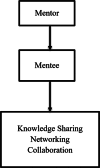Exploring the impact of early exposure and mentorship on the neurosurgery career aspirations of medical students in low- and middle-income countries
- PMID: 39239039
- PMCID: PMC11374203
- DOI: 10.1097/MS9.0000000000002396
Exploring the impact of early exposure and mentorship on the neurosurgery career aspirations of medical students in low- and middle-income countries
Abstract
Early exposure to neurosurgery has been shown to have a positive influence on students' perceptions and attitudes towards the field of neurosurgery. This review delves into the problems faced by the neurosurgery workforce in LMICs, highlighting the necessity for local and international collaborative strategies and plans to enhance the medical education curriculum, training, and retention of neurosurgeons in their home countries. Mentorship also emerges as a crucial factor in neurosurgical career progress, narrowing the gap between theoretical knowledge and real-world practical skills, and providing guidelines in career pathways. Despite numerous benefits of early exposure and mentorship, limitations such as limited resources, inadequate elective opportunities, and negative cultural influences, hinder students' interest in neurosurgery. However, initiatives such as global outreach programs and collaborations between HICs and LMICs aim to address these challenges and improve access to mentorship and training opportunities and programs. This review recommends the integration of mentorship into career development strategies, establishing well-structured mentorship programs, and strengthening neurosurgery exposure in medical education. By implementing these recommendations, the next generation of neurosurgeons can be better equipped to address the complex challenges in LMICs, ultimately, enhancing easy access to neurosurgical care and strengthening healthcare systems.
Keywords: LMICS; career aspirations; exposure; medical students; mentorship; neurosurgery.
Copyright © 2024 The Author(s). Published by Wolters Kluwer Health, Inc.
Conflict of interest statement
The authors declare no conflicts of interest.Sponsorships or competing interests that may be relevant to content are disclosed at the end of this article.
Figures
Similar articles
-
Impact of medical school experiences on the career choice of neurosurgery: a cross- sectional study from Pakistan.BMC Med Educ. 2024 Apr 26;24(1):465. doi: 10.1186/s12909-024-05452-9. BMC Med Educ. 2024. PMID: 38671453 Free PMC article.
-
Neurosurgical training and global health education: systematic review of challenges and benefits of in-country programs in the care of neural tube defects.Neurosurg Focus. 2020 Mar 1;48(3):E14. doi: 10.3171/2019.12.FOCUS19448. Neurosurg Focus. 2020. PMID: 32114550
-
The Low-Income and Middle-Income Countries' Perspective on Global Neurosurgery Collaborations.Neurosurgery. 2025 Jun 1;96(6):1290-1300. doi: 10.1227/neu.0000000000003230. Epub 2024 Oct 11. Neurosurgery. 2025. PMID: 39392305
-
Access to training in neurosurgery (Part 1): Global perspectives and contributing factors of barriers to access.Brain Spine. 2022 Jun 9;2:100900. doi: 10.1016/j.bas.2022.100900. eCollection 2022. Brain Spine. 2022. PMID: 36248138 Free PMC article.
-
Neurosurgical Education for Medical Students: A Scoping Review.World Neurosurg. 2022 Jul;163:155-163.e6. doi: 10.1016/j.wneu.2021.05.034. World Neurosurg. 2022. PMID: 35729816
Cited by
-
Commentary on the impact of early exposure and mentorship on the neurosurgery career aspirations of medical students in LMICs.Ann Med Surg (Lond). 2025 Jan 9;87(1):428-429. doi: 10.1097/MS9.0000000000002806. eCollection 2025 Jan. Ann Med Surg (Lond). 2025. PMID: 40109632 Free PMC article. No abstract available.
References
-
- Punchak M, Mukhopadhyay S, Sachdev S, et al. . Neurosurgical care: availability and access in low-income and middle-income countries. World Neurosurg 2018;112:e240–e254. - PubMed
-
- Gupta S, Gal ZT, Athni TS, et al. . Mapping the global neurosurgery workforce. Part 1: Consultant neurosurgeon density. J Neurosurg 2024;1(aop):1–9.
-
- Du RY, Thiong’o GM, LoPresti MA, et al. . Pediatric neurosurgery in East Africa: an education and needs-based survey. World Neurosurg 2020;141:e374–e382. - PubMed
-
- Cortez MM, Wold JJ, Renner DR. International Issues: expanding neurologic education to resource-poor countries: lessons from Moi Teaching Hospital. Neurology 2014;82:e18–e20. - PubMed
Publication types
LinkOut - more resources
Full Text Sources
Miscellaneous

